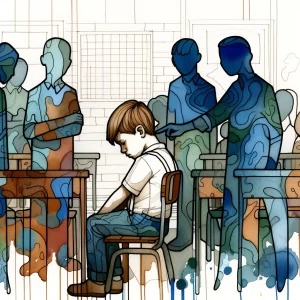
What Happens if the Department of Education is Abolished? The Future of U.S. Schools
Education in America is at a crossroads. While schools should be spaces where all children can thrive—academically, socially, and emotionally– the current federal policy agenda threatens to unravel critical federal protections, funding, and programs designed to support students’ well-being.
Project 2025, spearheaded by The Heritage Foundation and a coalition of conservative organizations, presents a radical vision for the U.S. education system. This vision includes dismantling the Department of Education entirely. This move would fundamentally reshape education policy, leaving schools, teachers, and students vulnerable to a patchwork of state laws that could widen existing inequities.
Dissolving the Department of Education: What It Means for Schools
The proposal to eliminate the U.S. Department of Education (DOE) is central to Project 2025’s education agenda. Proponents argue that education policy should be a purely state and local issue, with minimal federal oversight. However, dissolving the DOE would have far-reaching consequences:
- Loss of Protections for Vulnerable Students: The DOE plays a crucial role in enforcing civil rights protections in schools, ensuring that students with disabilities, LGBTQ+ youth, and students of color have access to safe and equitable learning environments. The Office for Civil Rights (OCR) investigates discrimination claims and holds schools accountable for policies that exclude or harm students. Without this federal oversight, enforcement of these protections could become inconsistent or nonexistent, leaving students more vulnerable to discrimination and harassment.
- Drastic Cuts to Federal Funding: Federal funding supports vital programs, especially in low-income and under-resourced schools. Without the DOE, programs like Title I (which funds schools serving high percentages of low-income students) and IDEA (which ensures special education services for students with disabilities) could be gutted or left to the discretion of state governments, many of which already underfund public education.
- The Future of Mental Health in Schools: Schools have increasingly become centers for student mental health, offering counseling services, trauma-informed teaching, and initiatives to address social-emotional learning (SEL). The DOE has been a key player in funding and expanding these resources. Under Project 2025, the movement to dismantle federal education oversight threatens funding for mental health grants, school psychologists, and programs designed to create supportive learning environments.
The Ideological Shift: Rolling Back Progress on Equity and Inclusion
Beyond dissolving the DOE, Project 2025 aims to curb discussions on race, gender, and social-emotional learning, framing these topics as “woke indoctrination.” This has direct implications for:
- Curriculum Restrictions: States influenced by this policy could limit discussions on diversity, inclusion, and mental health, restricting teachers’ ability to provide culturally responsive education.
- Book Bans and Censorship: Conservative groups aligned with Project 2025 have already pushed for book bans and curriculum restrictions that prevent students from learning about systemic inequality, historical injustices, and LGBTQ+ rights.
- Parental Rights vs. Student Safety: While Project 2025 promotes “parental rights,” it often does so at the expense of student autonomy and safety, particularly for LGBTQ+ students seeking affirming spaces in schools.
What’s Next? Advocating for Safe and Inclusive Schools
While Project 2025 paints a stark picture of education’s future, advocacy groups, educators, and families are mobilizing to defend inclusive, well-funded, and student-centered schools.
- Support Public Education Funding: Stay informed about legislation that affects school funding at the federal and state level.
- Advocate for Mental Health in Schools: Push for continued investment in school counselors, social-emotional learning, and mental health resources.
- Defend Inclusive Policies: Speak out against curriculum restrictions and policies that harm marginalized students.
Education should be about empowering students, supporting mental health, and creating opportunities for all learners to succeed. Dismantling the DOE and implementing Project 2025’s extreme policies would move us backward. The time to stand up for equity, access, and student well-being is now.



